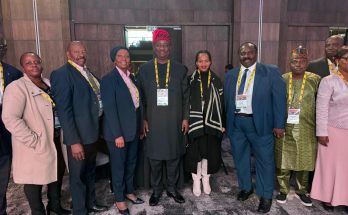Stakeholders in the environment sector has reviewed the draft National Environmental Plastic Waste Control Regulation that would enable key players to check plastic pollution in the country.
Director-General, National Environmental Standards and Regulations Enforcement Agency (NESREA), Prof. Aliyu Jauro, said the draft has been validated across all the six geopolitical zones.
He added that it will provide the needed tool to enforce the policy.
In his words: “We will reap the benefits of plastic waste control. It is a valuable resource in terms of its contribution to Gross Domestic Product (GDP) and job creation. Nigeria’s per capital consumption of plastics will grow further at 5-7 per cent per year.
“The policy on plastic waste management was aimed at reducing plastic pollution in the environment by 50 per cent by the year 2025.We strongly believe that the National Environmental Regulations will provide the needed tool for the enforcement,” he stressed.
The Chairman of the occasion, Prof. Babajide Alao, said the gathering was meant to carry out the final review of the document, as the issue of plastics pollution has become a global challenge to humanity.
Alao stated that the world may have been bombarded with million tonnes of plastic to the extent that streets, dumpsites, gutters, streams, seas and oceans are filled with these dangerous products that lacked proper mechanism on how to handle it.
“The policy will not push them out of business, saying, “we want to eliminate plastic pollution and set up community-based facilities for the collection of wastes.”
In a presentation, Dr. Leslie Adogame said: “We are developing legislative instruments, standards, trade measures, models and systems that would support plastic waste management taking cognisance of the lifecycle in an environmentally sustainable and socially safe manner in the country.
According to him, it will limit littering of single use plastics, packaging products and waste materials in the environment, as well as reduce plastic waste generation by 50 per cent of its baseline figure of 2020 by year 2025.
He maintained, to reduce plastic debris from land-based activities that becomes (atmospheric, terrestrial and aquatic) litter in line with respective environmental, as well as reduce the global warming and greenhouse effects associated with plastic production by 2030.
“We intend to generate a database on plastic from production through use to its disposal including import or export taking cognisance of the lifecycle approach in the country for informed decisions on partnerships with manufacturers, recyclers, around a specific goal.”
The European Union was represented by Godfrey Ogbemudia urged the government to carry out enlightenment campaigns on waste management, encouraging investors to build plants that will reduce the menace of plastic pollution.
The United Nations Industrial Organisation (UNIDO), representative, Emem Umona
said they worked with Nigeria to promote the country’s circular plastic economy by putting in place regulations, hoping that when they are enforced, they will check and reduce the menace of wastes.
On his part, Sandeep Pahaiaya of Indomana Ventures Limited, hinted that there are millions of wastes, including plastic materials, “There are problems in collecting them; unfortunately, no regulation has been put in place. However, we are recycling millions of them here.
Ahmed Tiamiyu of Community Action Against Plastic Waste, said Nigeria is a net importer of plastic because of not refining crude oil, saying, apart from waste management problem, plastic pollution is a threat to public health and environment.




